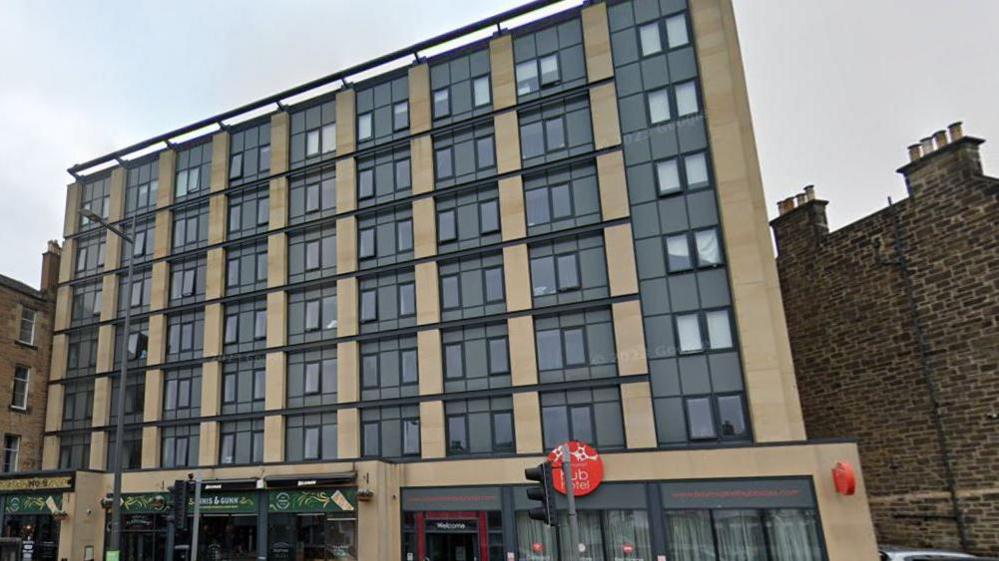Homeless to be moved out of unlawful B&Bs and hotels

Hotels and B&Bs have been used as temporary accommodation since the Covid pandemic
- Published
A plan to move hundreds of homeless people in Edinburgh out of unlicensed temporary accommodation before the end of the month has been agreed by councillors in the city.
City of Edinburgh Council provided hundreds of rooms in hotels and B&Bs as temporary accommodation in response to rising demand since the pandemic when emergency action was taken to prevent the spread of Covid-19.
However, more than 700 households still live in 28 properties that have failed to meet licensing regulations as Houses in Multiple Occupancy (HMO).
At an emergency housing committee, councillors agreed to suspend new applicants for homeless housing and non-urgent repairs in order to prioritise moving people out of HMO accommodation to more suitable properties.
Urgent action
Lawyers had previously warned the council it was committing a criminal offence by paying operators who did not comply with its own health and safety licensing requirements.
These include checks that a landlord is a fit and proper person, and that tenants are afforded adequate living standards, and an appropriate number of bathrooms and toilets are provided - which most hotels and B&Bs are unlikely to pass.
The council is now taking urgent action in a bid to move everyone in the city currently in unlicensed HMOs into alternative, lawful accommodation by the start of December.
This includes halting any new council house allocations until January - unless disabled or awaiting discharge from hospital - and diverting more resources towards getting void properties back into use.
The initial decision to significantly increase the amount of temporary accommodation available was taken at the start of the first Covid lockdown in 2020.
At the time, inspections of all the properties were made to ensure the safety requirements were met and landlords in breach of the rules were requested to register for an HMO licence.
A report last month by the council's monitoring officer Nick Smith said the decision was taken "on a balance of risk, considering the public health requirements at the time, as well the need for the landlord to be (or become) registered".
The report stated that many landlords took action, however others refused or did nothing.
The number of households in temporary accommodation across the capital has risen from 3,570 in 2020 to more than 5,000 this year.
House in multiple occupancy
A House of Multiple Occupancy is a title given to properties that house three of more residents from more than one different household, who share a kitchen, toilet or bathroom facilities with the other tenants.
Landlords must apply for a specific HMO licence to be allowed to rent the property out under these conditions.
Operating an unlicensed HMO is a criminal offence.
According to Mr Smith's report, the council remains in breach of its HMO licensing duty by maintaining to support homeless households in some unlicensed properties.
'Unprecedented pressures'
The most recent housing committee report outlining required actions to end the use of HMOs stated “the use of this accommodation was always subject to an exit plan”.
The council plans to stop paying the unlicensed providers of HMO properties in early December.
To achieve this, the council has suspended applications for social housing.
EdIndex, the Edinburgh housing portal used by homeless individuals to bid for council houses, allows people to get on a waiting list for longer-term solutions.
Empty homes are usually advertised online but the site says this has been temporarily paused due to “unprecedented pressures”.
Non-essential repairs have also been paused until January to prioritise work to get more void homes back into use.
Edinburgh City Council’s housing convener Jane Meagher said: “With greater numbers of people facing homelessness, some of the most expensive private rents in the UK and insufficient funding from the Scottish government to build more homes, the pressures on temporary accommodation are unprecedented.
“The stark choice facing us is that we either house people in unlicensed HMOs or people will have to sleep on the streets which no one wants.
"We’re in a critical position that means we need to escalate our efforts to address this."
The council reiterated that it “urgently needs to move people out of these properties and find alternative temporary accommodation", stating its plans to use "existing council stock" and engage with housing providers to ensure licences meet regulation standards.
Ms Meagher said: “The council leader and I have spoken with senior ministers and the Scottish government recognises that we need to work together on this to make sure everyone facing homelessness in Edinburgh and beyond is supported."